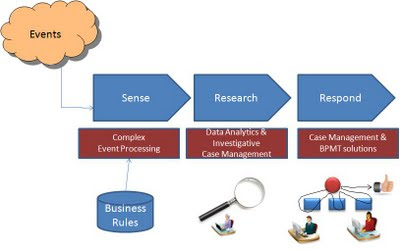In recent discussions and a number of projects we have done, we see an emerging pattern: Sense-Research-Respond.
Typical situation: the need to respond to an ever increasing number of alerts/signals/data, but to do this as cost effective as possible.
A number of business situations:
- An organisation knows it can and should detect signals of fraud by clients and internal workers and respond to it, but is trying to find an efficient way
- Inspection agencies that need to cut cost, and are moving to more risk-based inspections instead of trying to do 100%. But: how to pick the right risk-situations and tune the selection process, based on insights?
- Organizations that see the enormous growth in social media, and are finding references to their products and organization (positive and negative) and want an innovative but economic way to deal with these developments
In the last years we have seen the following pattern for these type of business situations:

The key ingredients:
- The capability to sense: to filter and detect data/events (and when needed correlated ones), that need attention. Usually driven by business rules ("risk profiles"), and easily tuned. The typical technology: Complex Event Processing, based on technology from for instance Tibco, IBM.
- The capability to research: advanced tooling, such as Palantir, SAS, to further research a certain situation, link it to other earlier events and to support decision making: will we need to react to this,and give it priority over other signals (as resources and time is constrained)
- The capability to effectively handle the situation, efficiently coordinating people in own and possibly other organizations. Sometimes this can follow pre-defined structured processes, but often, as situations can differ greatly, might require more flexible case management solutions. Technology such as Pega, Cordys, BeInformed, IBM.
And we have learned that technology is mature enough to handle these situations.
We have even developed a number of offerings around it, such as our "Grapevine" offering for social media. See here for a short video. Another is our Alert offering for Fraud detection.
Fascinating times. My lesson: don't ignore the growing available data-volumes (and become obsolete). Don't drown (and go under). But conquer in a smart way to use effectively. The ability to respond is a critical capability in modern organizations.
